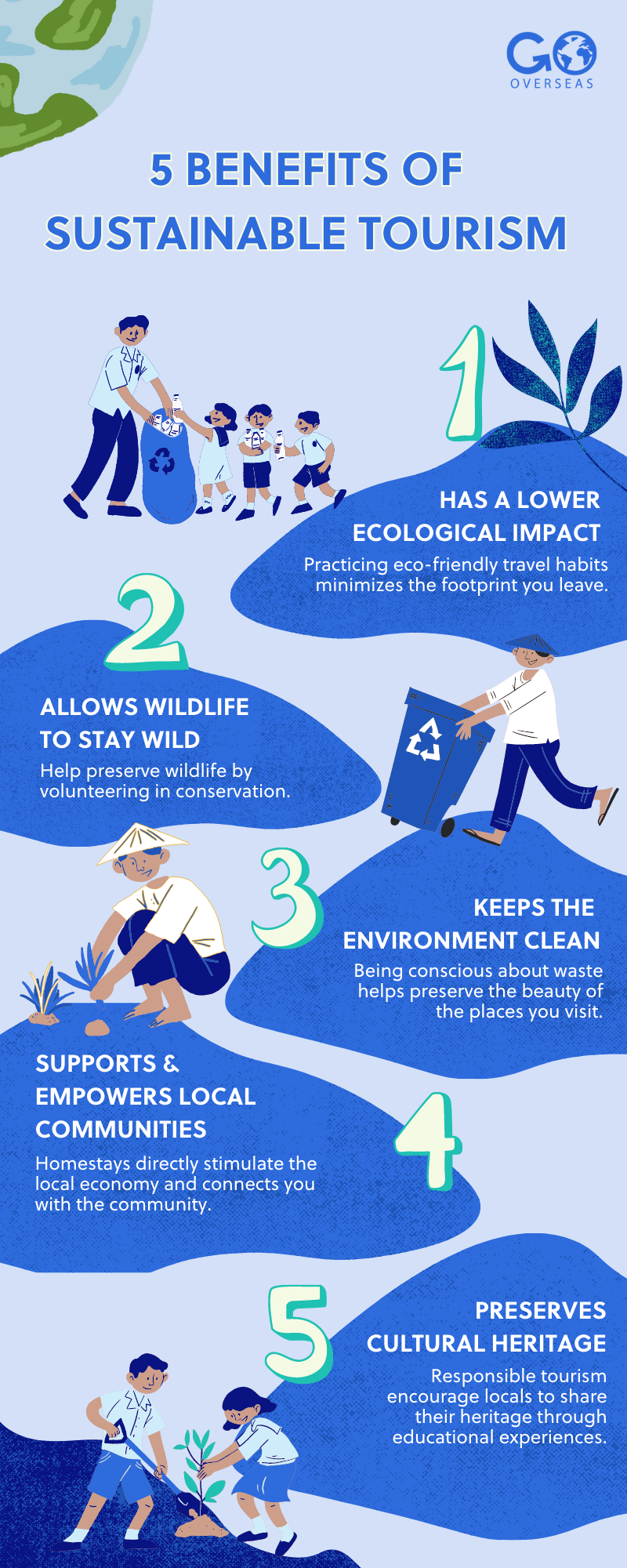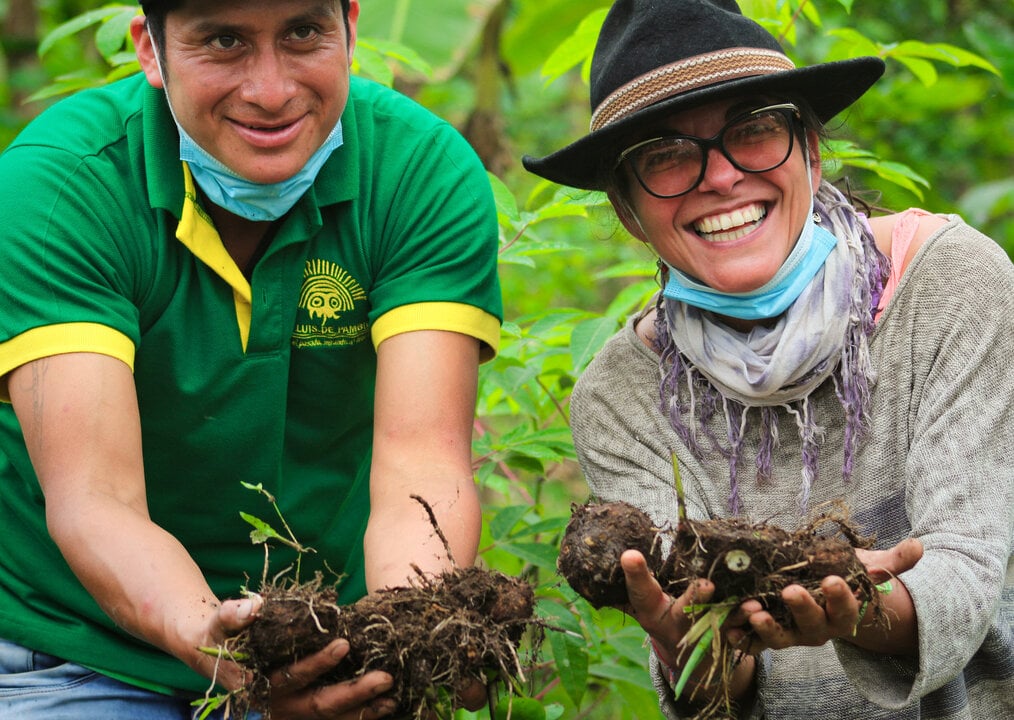
7 Benefits of Sustainable Tourism & How to Travel Responsibly
We’re here to walk you through the benefits of sustainable tourism and how you can make a difference while you travel.

You’ve probably already heard of sustainable travel, with green tourism on the rise in the last few years. While travel is enjoyable and eye-opening, it can bring harm to both the environment and the local population of the places you’re visiting. Although many travelers have good intentions when they travel, not all make well-informed decisions with their destination’s best interest in mind.
Because of this, sustainable tourism has become an afterthought rather than a norm. To help you travel more responsibly, we’re here to walk you through the benefits of eco tourism and how you can make a difference.
We'll discuss what sustainable tourism is, and its benefits to you, local communities, and the environment, so you can make an informed decision about your next trip!
What is sustainable tourism?
Sustainable tourism is traveling with the purpose of creating a positive impact on the environment, society, and economy.
It involves minimizing negative impact on the places you visit, and contributing to the overall development and conservation of travel destinations by protecting the environment and the welfare of the people who depend on it.
So, is tourism actually sustainable?
Although there are many ways to travel responsibly, tourism will never be completely sustainable. Every industry creates its own impact, and tourism is no different.
As a traveler, you can help make the tourism industry shift towards sustainability, by making conscious choices that ensure the environment and local communities can thrive.
Whether you’re preparing to study in South Africa, intern in England, or volunteer in Thailand, there are many ways you can make your travel more sustainable. By practicing eco-friendly, responsible travel and understanding the benefits of sustainable tourism, you can help leave a positive impact.
Benefits of sustainable tourism

Now that you know the impact green tourism has on the places you visit, let’s take a look at some of the amazing benefits of ecotourism.
1. It has a lower ecological impact
Everything you do while on vacation has an impact on your ecological footprint—how you get there, where you stay, what activities you do, and what you eat. The goal of green tourism is to minimize this.
We understand that travel should be relaxing, but there are a lot of easy ways to protect the environment during your trip.
Simply eating local produce and food from a local business can already make a huge difference. Imported food, whether across the nation or the ocean, comes at a huge cost – economically and environmentally. Plus, part of the experience of traveling to new places is learning about the culture through food! Not only does local food allows you to save a lot of emission, it also introduces you to new flavors you might end up falling in love with.
If you want to reduce your carbon footprint even more, you can avoid flights if your destination is reachable by train, bus, or other eco-friendly travel methods. When air travel is unavoidable, opt for direct flights and purchase carbon offsets. Don’t forget to pack light too.
2. It allows wildlife to stay wild
Preserving wildlife is a major part of responsible tourism. But in many destinations, animals are used to attract tourists, but are not necessarily treated well.
Think riding elephants in Thailand or swimming with pink dolphins in the Amazon – while participating in these activities seems innocent, they’re not good for the animals.
Elephants suffer from pain and early deaths. Dolphins are attracted by frozen fish supplied by tourism providers, moments before tourists swarm to touch, ride, restrain and even lift them out of the water. All of this is done so that tourists can have a photo opportunity. At times, photos aren’t even enough. Some tourists take a part of the animal as a souvenir, like tortoise shells, tiger fang, or ivory with them when they go home.
Making informed travel decisions allow you to avoid attractions that do not have the best interest of the animals in mind. If the demand for this kind of entertainment diminishes, these places will cease to exist one day. Wildlife is able to stay wild.
This will also empower local communities to work in sustainable travel jobs, protect wildlife, and engage in green tourism, rather than resort to exploitation.
Seeing wildlife in their natural habitat is a unique, once-in-a-lifetime experience. If you really want to get close to wildlife, there are many volunteering projects that work in the field of conservation. Adding a volunteering period to your trip will give you an unforgettable experience while supporting important projects and experiencing the benefits of sustainable tourism.
3. Responsible tourism keeps the environment clean
Once travelers get lost in local markets or relax in their resorts, keeping the environment clean often comes as an afterthought or not at all. This can lead to excessive waste, from plastic pollution on beaches to high demand on energy in hotels.
Green tourism starts at home. Look for red flags when researching accommodations, like issues with garbage or wastewater. Ask the tough questions and learn how to spot greenwashing .
Debunk your accommodation’s eco claims. If your hotel says they’ve banned all single-use plastic, find out if this includes their single-use plastic shampoo, conditioner, and bath gel bottles or the plastic laundry bags for washing guests’ clothes and linen. Take a look at your hotel’s alternatives to plastic wrap for food and beverage in their restaurants, from where and how they source their ingredients to when they serve their guests.
Ask them about waste reduction. Does your hotel refuse unnecessary packaging from suppliers? Do they encourage guests to reuse bed sheets and towels? Are their bathrooms and kitchens equipped with refillable containers? Do they have recycling bins or a compost for food waste? Are they using low-flow showers or water-efficient appliances? Is there a system set up for conserving energy?
Opt for sustainable travel destinations, rather than overcrowded places suffering from the negative impact of mass tourism.
When packing for your trip, consider bringing these eco-conscious items to help reduce waste while you travel:
- Reusable cutlery and food containers
- Reusable straws and a reusable water bottle
- Cloth napkins
- Toiletry bag with reusable travel-sized containers
- Travel towel
- Menstrual cup
- Reusable shopping bag / backpack (for shopping and souvenirs)
At the end of the day, your conscious choices about waste help support the best benefits of sustainable tourism—keeping communities cleaner, and preserving the beauty of the places you visit.
4. It supports and empowers local communities
By supporting local communities, you get a unique chance to immerse yourself in local culture.
Staying in locally owned hotels, guesthouses, and homestays give you the opportunity to directly stimulate the local economy and connect with locals on a personal level.
You can also get a similar experience with reputable local tour operators. The money you spend employs locals in sustainable travel jobs, and goes to the pockets of people involved in making your holiday memorable.
Ever tried nasi lemak on a roadside in the Malaysian countryside? How about a brick-oven pizza on the streets of Naples?
You won’t get the chance to sample these dishes in restaurant chains, and even if you do, chances are, they’re overpriced and inauthentic. Eating in a local restaurant guarantees your food is healthy, fresh, and reasonably priced, since ingredients are grown or bought locally.
Shopping local products and souvenirs allows you to buy items you might not find anywhere else, and ensures your money goes to local artisans.
5. It preserves cultural heritage
When done responsibly, tourism can provide insightful and educational experiences to visitors and encourage locals to share their cultural heritage.
For example, traveling with a gap year program may allow you to learn traditional crafts from local artisans, which is a once-in-a-lifetime experience you can only gain from trips focused on the rich cultural tapestries of the places that you visit.
Locals will embrace their heritage and view it as something to be proud of and worth preserving, enabling them to develop their homes into sustainable travel destinations.
6. You’ll have a more meaningful experience
Let’s say cruising across the desert is on your bucket list. You hire a 4x4 to drive across the dunes, and end the day with a nice picnic overlooking the endless sea of sand. You leave the desert with wonder at what you’ve seen.
But if you choose to stay with the nomadic Bedouins on your trip, you’ll get a glimpse of the traditional desert-dweller lifestyle. You’ll have a chance to see where they live in such harsh landscapes, listen to their music and poetry, and experience their amazing hospitality.
Engaging in green tourism broadens your horizons and allows you to walk away with not just an impression on the beauty of the places you visit but also a deeper and more meaningful connection with the communities you meet.
7. You become a more conscious traveler
One of the biggest benefits of sustainable tourism is becoming more responsible with your choices.
That can mean choosing greener transportation to get to your destination and / or staying in eco-conscious accommodations.
You may even find out there are locations you shouldn’t visit if you want to keep them sustainable. Some tiny islands can't sustain many tourists, and some communities are not able to deal with a huge number of people due to infrastructure. In these cases, the best thing to do is avoid the destination altogether.
Other ways you can take part in responsible tourism include opting to dine in a local restaurant rather than bringing McDonalds back to your hotel, and traveling slower by using your vacation time to support an important cause.
Ways to travel more responsibly
Changing your perspective on responsible tourism and developing sustainable travel habits shouldn’t be demanding. Most sustainable travel practices actually require very little effort, but produce great results.
- Opt for sustainable travel destinations, go off the beaten path, and/or visit during off-season.
- Travel slower. Instead of rushing to tick off all the top-recommended tourist attractions, travel through a country for a longer time, if you can. Allow yourself to immerse in your surroundings and connect with the locals. This will provide you with a better understanding of your destination’s culture, history, and traditions.
- Turn off the lights in your accommodation, and unplug electronic devices when they’re not being used.
- Take shorter showers, and do laundry in bulk.
- Reuse towels and bed linen, if they’re not soiled.
- Dress appropriately for the destinations you plan to visit.
- Ask locals for permission before you take their photos.
- Learn a few phrases in the local language to establish connections with local communities.
- When visiting pristine and untouched landscapes, be careful of geotagging them when you post on social media. This helps avoid mass tourism.
- When exploring destinations with fragile ecosystems, check whether the area is properly maintained, and find out about local conservation efforts.
- Make sure your accommodation employs locals and treats them well. Bonus points if they also have a diverse and inclusive workforce.
- Support tourism businesses that follow and respect local regulations and / or possess sustainable credentials.
- Ask about the environmental policies of the accommodations and services you book with.
Infographic: Benefits of sustainable tourism

Do what you can, and be proud of it

Sustainable tourism is not always black and white – there are many shades of gray in between.
Likewise, there is no such thing as being 100% sustainable when you travel. That’s why it’s good to keep in mind not to aim for perfection. Rather, do what you can to travel responsibly.
Educating yourself and making a conscious decision to support sustainable and ethical service providers is the first step. Remember that cumulative choices from members of the travel community are what pave the way towards responsible tourism. Together, we can definitely make travel more sustainable!
Read more:






